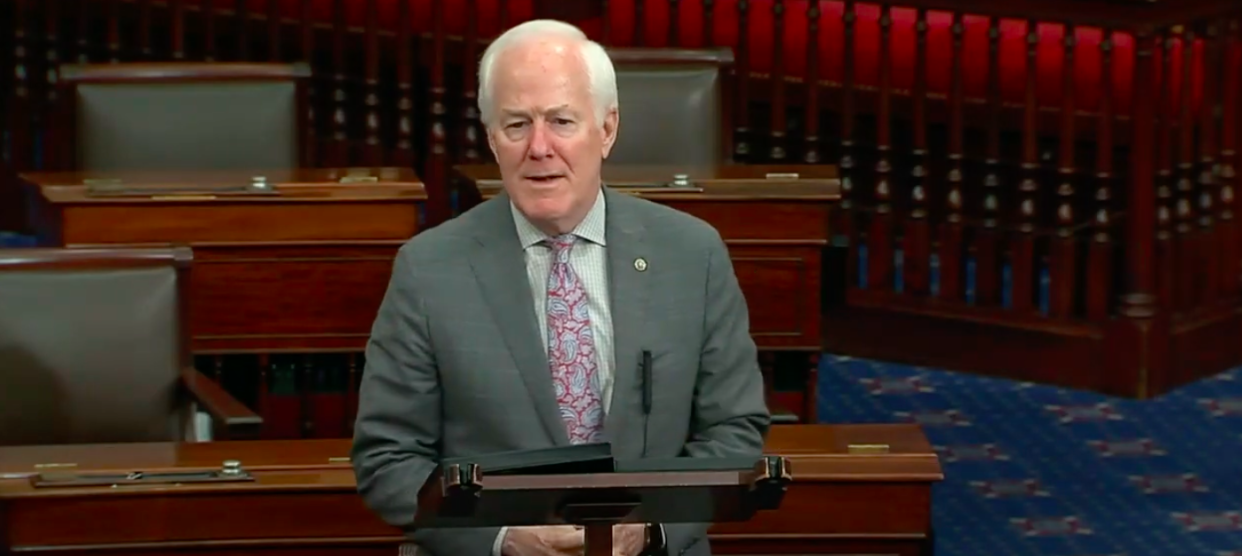US House pushes through chips bill that could benefit Texas

WASHINGTON — The U.S. House on Thursday approved a plan to invest billions of dollars in semiconductor manufacturing and research, pushing the measure through after GOP leaders reversed course and opposed it over an unrelated budget deal in the Senate that angered Republicans in both chambers.
U.S. Rep. Michael McCaul, R-Austin, co-author of the legislation, known as the Chips and Science Act, was one of only 24 Republicans to vote in favor of the bill, which passed 243 to187. Rep. Kay Granger, R-Fort Worth, also broke with the GOP leadership to vote for the bill.
Central Texas Republican Reps. John Carter of Round Rock, Pete Sessions of Waco, Chip Roy of Hays County, Roger Williams of Austin and Mike Cloud of Victoria voted against the bill. Rep. Lloyd Doggett, D-Austin, joined all Democrats in voting for the bill.
“For decades, Austin has been a leader in groundbreaking semiconductor development — a sector with over 20,000 employees, adding over $3 billion to our local economy,” Doggett in a written statement. “Today, as CHIPS-Plus has overcome Republican opposition to pass the House, we are unlocking essential federal support for our economic and national security.”
The Senate passed the bill Wednesday on a 64-33 vote, with bill sponsor Sen. John Cornyn, R-Texas, leading the effort to get it approved to jump-start U.S. production of the chips, which are now primarily built in China and East Asia. Sen. Ted Cruz, R-Texas, voted against it, saying that giving companies billions in taxpayer dollars was “corporate welfare.”
More:Samsung weighs huge Austin-area growth: $200 billion investment, 11 new fabs, 10,000 new jobs
Texas is expected to benefit from the bill, which now goes to President Joe Biden for his signature to become law.
The bill subsidizes domestic production of chips with $52 billion in incentives and research grants as well as tax credits as a way of generating made-in-the-USA semiconductors, a staple of products used constantly by Americans, from phones to cars to planes. The bill also calls for increased spending on various research programs that would total about $200 billion over 10 years, according to the Congressional Budget Office.
McCaul, Cornyn and Gov. Greg Abbott say the funding will have a big impact in Texas, which is already a leading chip producer and has such companies as Samsung and Texas Instruments poised to expand semiconductor production.
“Already we have commitments for more than $220 billion in investments in Texas to begin manufacturing these advanced semiconductors,” said McCaul, the ranking member of House Foreign Affairs Committee in a statement. “But this isn’t just about jobs – or Texas. This is about U.S. national security. If the U.S. lost access to advanced chip making in Taiwan, our economy could lose $2 trillion.”
'Inflation Reduction Act': What you need to know about major effort to fight climate change
South Korea-based Samsung recently indicated it was considering building 11 new chipmaking factories, known as fabs, in the Austin area over the next 20 years. Samsung has applied for tax incentive agreements with both the Taylor and Manor school districts that could save it an estimated $4.7 billion if it builds all 11 of the proposed fabs in Austin and Taylor. None of the tax breaks have yet been approved by those districts' school boards, and Samsung has said it is still considering other sites for those facilities.
Samsung recently started work on a $17 billion semiconductor plant in Taylor, which is 25 miles northeast of central Austin, and it has two fabs already operating in Austin.
Cornyn and Abbott both said Samsung is considering the Texas sites for expansion. partly due to the federal legislation, which could provide additional subsidies.
“These new facilities solidify the Lone Star State as the nation's leader in the semiconductor industry, and I thank Samsung for increasing their investment in the hardworking people of Central Texas,” Abbott said July 20. He said a major factor for Samsung was the pending legislation.
In a tweet, Samsung said it “looks forward to @POTUS signing into law and building on our great partnership with the US to advance leading-edge chip manufacturing.”
Cornyn said during the Senate debate this week that the funding "will help kick-start domestic production of these semiconductors in a way that will prevent a vulnerability of our supply chain since 90% of those advanced semiconductors currently come from Asia. It's important for the United States to be in the game and not be left behind.”
Cornyn, however, said he was angered by a surprise budget deal crafted by Sen. Joe Manchin, D-W.Va., and Senate Majority Leader Chuck Schumer, D-N.Y., that enables a budget to be passed with only Democratic support — a plan that was only unveiled after the chips bill had passed the Senate.
The new deal resurrects a controversial Democratic budget pact on climate change, health care and taxes opposed by Republicans, sparking a highly charged debate ahead of the midterm elections. Republicans had said they would not have supported Democrats in moving the semiconductor legislation if the budget deal was viable.
Cornyn blasted Manchin, a moderate who is often a deciding vote in the 50-50 Senate, in a personal rebuke on the Senate floor.
“After saying repeatedly he would not support such reckless policies, he's done an Olympic-worthy flip-flop, and there's simply no denying it,’ Cornyn said. “Now Sen. Manchin not only supports the ‘Build Back Broke’ bill, he now said it’s his proposal. He, in effect, wrote it, and it includes the same policies that he previously opposed: tax hikes on working families and small businesses, Green New Deal climate policies, socialist price controls on prescription drugs.”
This article originally appeared on Austin American-Statesman: U.S. House pushes through chips bill that could benefit Texas
